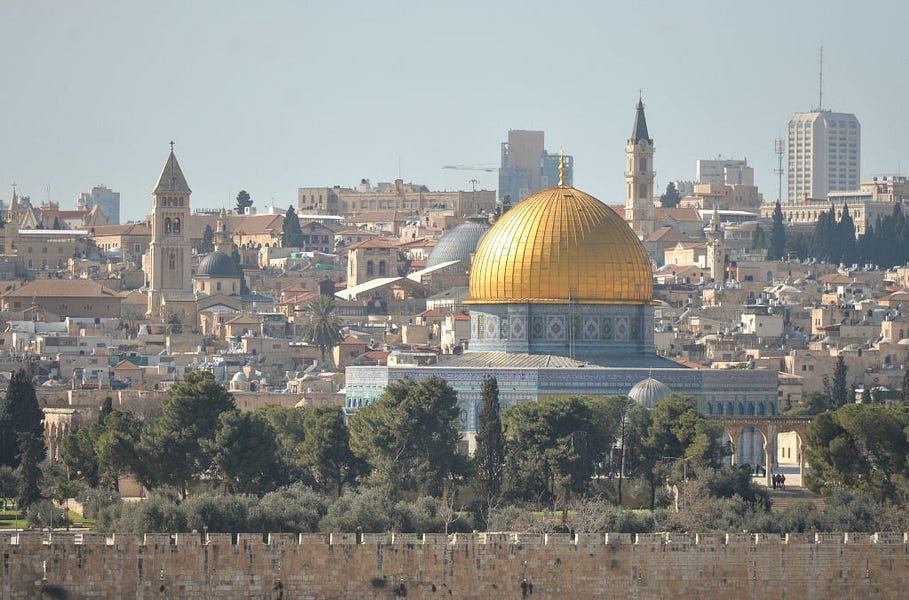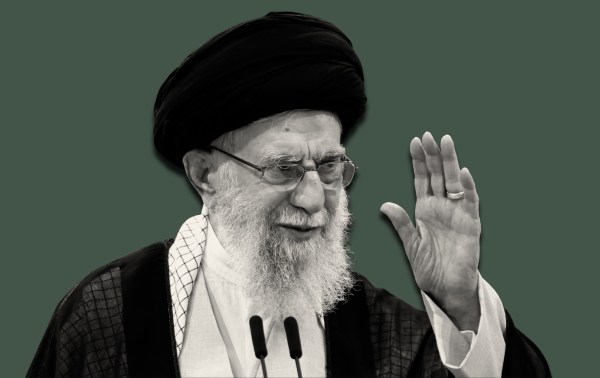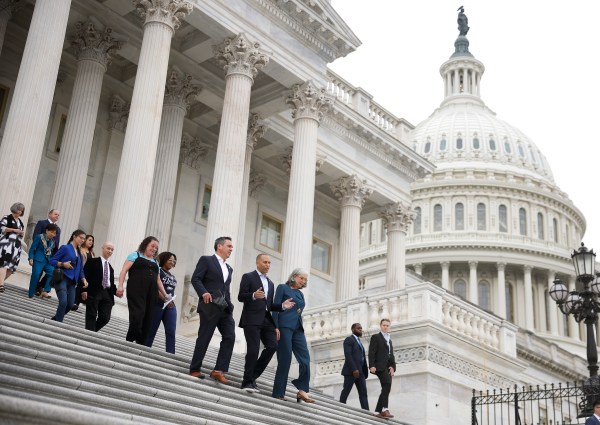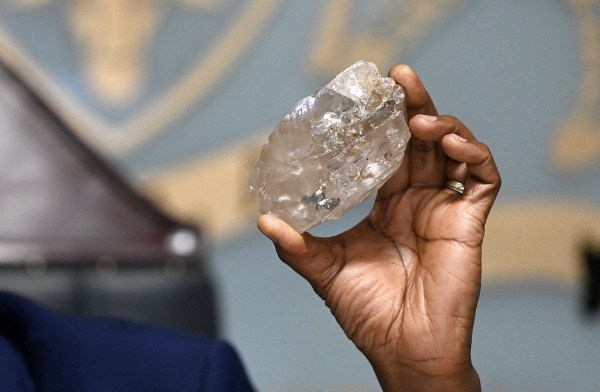As the Islamic Republic keeps on enriching more uranium, as more International Atomic Energy Agency surveillance cameras go offline and underground facilities expand, it becomes painfully clear that even if the Biden administration can still conclude some new nuclear deal with Iran, stopping the clerical regime’s atomic ambitions seems a dreamscape. There are, nonetheless, three Middle Eastern countries that might still derail the Islamic Republic’s regional ambitions. First, Iran itself might—that concatenation of sometimes mutually hostile peoples (Persians, Azeri Turks, Turkmen, Arabs, Baluch to name the largest groups) who increasingly share a distaste, if not loathing, for the Shiite theocracy, might make the clerical regime’s imperialism untenable. However, analyzing, let alone predicting the Islamic Republic’s internal chemistry, is difficult given the efficacy of the mullahs’ police state. It wouldn’t be surprising to see the country erupt in regime-cracking protests sparked by something barely noticed abroad; it wouldn’t be surprising to see the theocracy hold against the next tsunami of popular anger, increase military expenditures and expand its sway in the region. The regime’s base among the faithful urban poor and lower middle class still appears large enough to sustain the security services in a nationwide crisis.
One thing ought to be clear: The supreme leader, Ali Khamenei, is essentially a Shiite Trotskyite: He sees the expansion of Iran’s reach as an essential part of the Islamic revolution. Growing internal discontent may well reinforce the desire for the ruling elite to seek legitimacy in foreign adventures. Senior commanders in the Islamic Revolutionary Guard Corps, the muscle behind the theocracy, certainly see Iran’s presence in Syria, Lebanon, and Iraq—the historic Arab Shiite heartland where the clerical regime has successfully developed or deployed client militias—as crucial to the survival of the Islamic Republic.
Historically minded observers, especially those sensitive to ethnicity and the differences separating Sunnis and Shiites, sometimes see Turkey, either alone or aligned with Israel, as a potential bulwark against Persian expansionism. This juxtaposition does have historical resonance: The “gunpowder age” in the Middle East before the coming of the Europeans was in great part defined by the violent struggle between Sunni Ottomans and Shiite Safavids, who, though initially Turkish-speaking, became the icons of Shiite Persian power. Both were imperial states with a pretty keen sense of jihad; they regularly fought each other, most doggedly over Mesopotamia.
But post-Kemalist Turkey under the Islamist President Recep Tayyip Erdoğan probably isn’t Ottoman enough for an updated Turkish-Persian tug-of-war. Erdoğan has sent small contingents of Turkish forces far beyond Anatolia; significant deployments in Syria and Iraq have more or less hugged the Turkish border and aren’t that different from what the Kemalist army sometimes did. (Pummeling Kurds, who comprise about 20 percent of Turkey’s population, has been popular since Ataturk extinguished the empire after World War I.) Kemalism made Turkish Islamists nationalists: They have accepted, more or less, the confines, borders, and prejudices established by the secular Turkish Republic. The Turkish Islamist elite is much more Westernized than its Iranian counterpart: Lots of Turkish Islamists don’t care much for Europe and the European Union (lots of secular Turks also dislike intensely the Turkey-rejecting EU), but they recognize, however reluctantly, that they come from a hybrid culture. It is rare to find a Turkish Islamist of some accomplishment, in politics and business, who has the intense, molecular-level hatred of the West, especially the United States, that is standard-issue among the Iranian ruling elite and Arab fundamentalists. Antisemitism is undeniably common among Erdoğans people (officially sponsored antisemitism has been a problem in Turkey since the 1980s when the Motherland Party of Turgut Özal incorporated a substantial number of Islamists within its fold). Erdogan has at times loved sticking it to Israel, dramatically playing the defender of the Palestinian people and especially Hamas, the Muslim Brotherhood-born, ruling Islamist movement in Gaza that supports terrorism against Israel. Erdoğan’s family and friends have been exuberantly involved in Iran-sanctions busting, enriching the clerical regime and likely making billions.
And yet the Turkish intelligence service can still work with Mossad against Iran—as just reportedly happened with Iran’s so-far thwarted plot to kidnap Israeli tourists in Turkey. Erdoğan, who once called Zionism “a crime against humanity,” didn’t sever Turkish-Israeli commercial ties even when some worried in 2010 the Turkish and Israeli navies might collide over the “Gaza flotilla.” Israeli tourists have never stopped coming to Turkey—if anything, Ankara has encouraged more tourism (compare the Turkish political elite’s welcoming of Israeli tourism with the coldness shown by Egyptian President Abel Fatah el-Sisi’s military junta); Turkish exports to Israel have been rising significantly; Erdoğan described the state visit of Israeli President Isaac Herzog in March 2022 as a “turning point” in Israeli-Turkish relations. However Erdoğan sees Israel, Jews, and “global Jewish power,” it’s not the way Khamenei and Arab Islamic militants do.
American and Israelis fans of an Israeli–Turkish entente thwarting the clerical regime’s regional designs do routinely overestimate the Turkish military’s capacity and warring volition. The Turkish general staff probably doesn’t have the motivation and conventional matériel (it has the manpower) to dominate the northern Middle East, let alone the realm ruled by the Ottomans. Ankara is colliding with Tehran’s allies in Syria; it’s doubtful that the Turkish military or Erdoğan wants to make this a sustained clash that would seriously degrade Iran’s position in the region. If the Turkish political and military elite were more Islamist and ambitious, then they might well compete. Perhaps imitating Iranian success in creating non-Iranian Shiite militias throughout the Greater Middle East, Erdoğan has tried to piggy-back on Muslim Brotherhood networks and sympathy in the region. But the Brotherhood, never really an effective Islamist Comintern (it has remained too Egyptian and too decentralized), hasn’t given Erdogan much for his efforts. Other Turkish-supported paramilitary militias have fared better—the rag-tag, ever-mutating Syrian National Army has been the most malleable, deployable, and competent. It contributed to Turkey’s partial victory in the second Libyan civil war, where Turkish armed forces and the SNA directly intervened. But this outing pales in comparison to what Tehran brought to bear against the Sunni Syrian uprising against Bashar al-Assad.
Turkey is the most likely Middle Eastern state to go nuclear after the clerical regime gets the bomb; if Erdoğan is still in power, it’s easy to imagine him insisting on it. But even with Turkey’s sophisticated industrial base, a Turkish bomb would be years off—so, too, the muscular self-confidence that would probably come with its development. If Iran is to be checked in the Levant and beyond, Turkey’s role will, at best, probably be tangential. Israel, which has unstoppable nuclear delivery means, via missiles, planes, and submarines, and armed forces that can move quickly, lethally, and reliably, is really the only local counterweight that counts.
The Islamic Republic’s unrelenting westward focus toward Arab lands inexorably leads to Israel, which is seen as a Western implant reinforcing pro-American Sunni Muslim rulers inside a still-culturally West-intoxicated Middle East. Iran’s theocracy defines its mission civilisatrice, in part, by its uncompromising hostility toward Israel, which is, for Khamenei, a "colonial settler state” and a fundamental affront to Islamic history and theology. But does the Jewish state really want to check clerical Iran’s nuclear and territorial ambitions? Is Jerusalem able to become an interventionist power, willing to go to war far beyond its borders? Could the Abraham Accords, which Jerusalem wants to see as the cutting edge of a new era, be the beginning of an alignment that can work against Iran and possibly diminish the Jewish state’s pariah status in the larger, Sunni Muslim world?
All in the region can feel the void created by the decline of the United States. With Washington retrenching, with bad memories of Iraq and Afghanistan circumscribing American volition, it’s unlikely that even a hawkish Republican president would be willing to strike Iran’s nuclear facilities, and maybe not even check Iranian intimidation in the Persian Gulf. It’s an excellent conjecture that Washington’s big bureaucratic players in foreign affairs and national security—the Pentagon, the State Department, and the Central Intelligence Agency—want Israel to default to a doctrine of mutually assured destruction, a leitmotif appealing to Americans who use the Cold War as the measure of nuclear success. Israel ensnaring the United States in another thankless conflict with Muslims is the scenario many fear. Even if a new nuclear deal doesn’t happen, which is looking more likely, it’s hard to envision the Biden White House ever endorsing, even behind the scenes, Israeli prevention. It certainly wouldn’t agree, nor likely would any Republican successor, to arming Jerusalem with weaponry that might increase the likelihood and effectiveness of Israeli action against Iran’s nuclear sites. The only open question is whether Joe Biden would try to punish Jerusalem for a first strike.
The Persian Gulf’s Sunni Arabs—at least the ruling elites—probably want Jerusalem to take up the challenge. The United Arab Emirates, which don’t really speak with one voice and often provide a perfect definition of “Janus-faced,” keep it from being crystal clear. Nonetheless, Gulf Arabs, especially the fence-sitting type, may well base their future relations, and their sympathy for antisemitism, on whether Israel humbles the Middle East’s Shiite overlord.
The Jewish state and the Islamic Republic have de facto been at war since the Iranians decided the Syrian rebellion offered an opportunity to develop permanent bases in Syria. What Jerusalem has tolerated in Lebanon (the Iran-created Hezbollah has fabricated or imported a vast array of short- and medium-range missiles), it has been unwilling to accept in the rest of the Levant. In Syria the Israeli Air Force has regularly pummeled the IRGC and its militias. As a result, the clerical regime appears to have decided that big bases aren’t viable. If Moscow transfers its Syrian bases, with or without the accompanying, fairly sophisticated S400 anti-aircraft batteries, to Iran because of increasing demands for Russian manpower and materiel in Ukraine, Jerusalem may have to demonstrate again its resolution.
Israel’s more forward-leaning approach, which has also included raids into Iraq and lethal Mossad operations inside the Islamic Republic, and America’s concurrent retreat, diplomatically opened Arab doors that had been used only covertly earlier. The mystique of Jewish power, in this case playing to Israel’s advantage, has perhaps never been higher among the Gulf’s Sunnis, who once, not long ago, competed with the Egyptian military and Iranian revolutionaries in driving virulent anti-Semitism among Muslims worldwide.
American Decline
To understand the Jewish state’s current status in the Middle East, one needs to see clearly America’s decline, which has, more than any other force, created the environment that has allowed Israel’s stock to improve among Arabs. Even more than Iran’s nuclear aspirations—which would likely have little effect on any conventional duel between Riyadh and Tehran since the Saudis are not, and are not perceived to be in Iran, an offensive threat—America’s bipartisan consensus to reduce Washington’s commitments in the Middle East has thrust Israel forward. As America’s status has fallen, Israel’s has risen. The old Arab trope about Jerusalem being a satrapy of Washington, which sometimes got jujitsued into Washington being a poodle of rich American Jews in league with Zion, has been set aside as American isolationism has intensified.
The Iraq and Afghan wars reinvigorated the “Vietnam syndrome”—the idea that America is neither strong nor wise enough to wage war in the Third World, that U.S. interventions are more likely to cock things up than improve even the ugliest situations. Critics of the post-9/11 campaigns—and that’s now just about everyone in Washington’s political class and foreign-policy establishment—often add a Middle Eastern twist: The United States should keep its distance from Islamic lands, with their endemic violence and anti-Christian/anti-Western militancy, or risk moral compromise. The enemy is too dogged, too cruel, too hidden in the general population, for America to fight and maintain its sense of self. Drone to death the most militant anti-American Muslims if one must, but otherwise leave the denizens of the region alone.
Barack Obama and Donald Trump operationalized these sentiments. The former went fishing for a nuclear deal with the Islamic Republic, which would allow, in theory, for American retrenchment and “a pivot to Asia.” Obama certainly appeared to believe that if Washington were nicer toward Tehran, the clerical regime would reciprocate. Like many progressives, he had a bugaboo about the 1953 CIA-backed coup against the oil-nationalizing prime minister, Mohammad Mosaddeq, seeing it as a democratic betrayal and strategic mistake. Obama saw “engagement”—especially Western commerce—as a catalyst for the theocracy’s moderation. The United States could make concession after concession in the nuclear negotiations—about sunset clauses, the destruction of existing centrifuges, the development of more powerful and easier-to-hide centrifuges, intrusive inspections, undisclosed nuclear activities, vast quantities of unexamined paperwork and unquestioned personnel, ballistic missiles, and regional aggression—and evolution could well prevent the worst-case scenarios, which Obama probably wasn’t in any case prepared to stop militarily.
It certainly never seemed to cross Obama’s mind or those on his Iran team that any nuclear accord ought to increase America’s military commitment to the region to ensure Iranian compliance and quiet the anxiety of Gulf Arabs and Israel. Resorting to intimidation, America’s penchant for hard power, which could lead to further entanglement, was part of the problem—what John Kerry, in reference to Vladimir Putin’s seizure of the Crimea, called “19th century politics.”
Trump amplified what Obama left unspoken: The Islamic world is just a mess and the United States would do better if it could contract out to friendly Middle Eastern rulers the task of maintaining regional stability and counterterrorism. Trump was capable of killing the Iranian dark lord, Qassem Suleimani, the commander of the Islamic Revolutionary Guards’ Quds Force—an action that probably surprised his former national security adviser, John Bolton, who’d recommended the hit to Trump more than once only to have the president reject the action as too provocative. But Trump’s hawkishness was episodic, probably more an eruption of American pride and ego, not calculated preemption. Trump definitely didn’t like the idea of U.S. hegemony—far too much responsibility for far too much money for foreigners. He made kosher for the American right what Obama had recommended: a less interventionist, free-trade skeptical, foreign-policy-establishment-belittling, Pentagon-doubting America.
Joe Biden has put Obama and Trump on steroids. Where both Obama and Trump could sometimes be walked back from their instincts in the Middle East (do less, not more), Biden has so far kept true to the man who started walking away from the region in 2006, when he opposed George W. Bush’s surge in Iraq—after being one of the staunchest critics of Saddam Hussein and supporters of the war in 2003. Trump set up the withdrawal debacle in Afghanistan by engaging in direct negotiations with the Taliban that excluded the U.S.-supported Afghan government and freed thousands of Taliban prisoners who, of course, again took up the fight against the Afghan soldiers U.S. forces were supporting. The surreality of Trump’s negotiations set the stage for Biden’s calamitous exit. The mess in Afghanistan has, however, probably derailed Biden’s once obvious desire to do what Obama did: leave Iraq.
Even under Biden it’s still possible to foresee a situation where the U.S. Navy would intercede to prevent Iranian hegemony over the Persian Gulf’s energy resources. Oil is too important to allow Sunni Gulf Arabs the fiction that they can protect it—despite their massive purchases of American and European arms. But Trump may have changed the trajectory of our relationship with Saudi Arabia and the United Arab Emirates permanently in 2019 when he declined to respond militarily to Iranian attacks on shipping in the Gulf and the oil facilities at Abqaiq and Khurais.
The Saudis and Emirates, who have vastly greater air power than the Iranians, of course, did nothing, demonstrating once again that the world’s most sophisticated armaments don’t necessarily deliver security. The usually brash, intensely anti-Iranian/anti-Shiite Saudi crown prince, Muhammad bin Salman, certainly looked humbled. Iran might be able to down these states without firing a shot—it really depends on whether anyone in the region believes the United States is still willing to intercede. Or whether Israel can assume the American mantle.
The Israeli Vortex
Zionist hard power has unquestionably deterred Iran: Neither Tehran nor Hezbollah have let loose missiles, from Iran or Lebanon, for the substantial damage the Jewish state has wrought in Syria. Or in Lebanon: Jerusalem launched Operation Northern Shield in December 2018—a major preemptive action to destroy tunnels Hezbollah was building from southern Lebanon into Israel. Those tunnels may have been part of an Iran/Hezbollah layaway plan to send terrorists south at some unspecified time; the tunnels, which were undoubtedly paid for by Iran, could have been built in response to Israeli actions in Syria. In any case, neither Northern Shield nor the killing in Syria of Revolutionary Guard personnel nor the substantial destruction of Iranian matériel has moved Tehran or Hezbollah to up the conventional-military ante. Lethal Mossad actions inside Iran may have provoked Khamenei to send assassination teams to Turkey to pick off Israeli tourists. Such a policy doesn’t suggest, however, a confident military power eager to confront the Jewish state.
Culturally, Israel’s breakthrough with the Abraham Accords might prove lasting if it is premised on a fundamental spiritual shift among the Gulf’s Sunni Arabs. The Saudi crown prince, who sometimes can give the impression that he thinks Jews, at least American ones, just might be “the chosen people,” has obviously held back from officially recognizing Israel in part because he is uncertain whether such actions help him. And it’s hard to see now what MBS gains by officially embracing Israel, at least before Jerusalem proves that it’s willing and able to take out Iran’s nuclear ambitions. Israeli high-tech isn’t going to make the Arabian Peninsula bloom (probably nothing will); European and American industry can provide anything that the Israelis can without possible ugly internal repercussions (Israeli investment and technology would come with fewer political strings attached). Japanese and Chinese companies are also default choices. If an Israeli embrace of Saudi Arabia came with a security guarantee that would obligate Jerusalem to go to war to preserve the monarchy, something that the Knesset would likely reject and MBS would be wary of accepting (a bit humiliating for the kadim al-haramayn ash-sharifayn, the custodian of the two holy sites, Mecca and Medina, to be dependent upon Jews), it’s possible that MBS, and other Saudi royals, might think the gain worth the risk. If Jerusalem is unwilling to strike Iran’s nuclear sites preventively, however, then Israel certainly won’t risk much to protect Saudi Arabia after Iran goes nuclear.
If Jerusalem does strike, and the nuclear sites are destroyed, it is conceivable that the Abraham Accords could gain momentum. Saudi Arabia no longer has a position of religious pre-eminence among Sunni states; the Al-Saud no longer feed the faith as generously as they once did. The Saudi Wahhabi ulema are on a fairly tight leash; it’s by no means clear that MBS’s actions—in this case, recognizing Israel—would reverberate in Jerusalem’s favor among Sunnis. It might help; it might not matter much; it might give Iran a propaganda victory on the margins. (Tehran’s vast slaughter of Sunni Syrians has probably permanently damaged the clerical regime’s capacity to rally Muslims against Saudi Arabia and other Sunni rulers seen as too servile to the West.) The Palestinian cause has become tiring in much of the Muslim world, but it still has, depending on the country, some traction.
Antisemitism among Muslims, as the historian Bernard Lewis noted, has been a top-down affair (the elites drove its spread). If that is still the case, then having MBS and others in the Saudi royal family take a less hostile attitude toward Jews might diminish the pestilence. But antisemitism in the Middle East has been stoked relentlessly since the 1930s, first by Europeans, then pan-Arabists and Arab nationalists, and finally by fundamentalists. It’s a very hard thing to gauge, but it’s not unlikely that antisemitism there has now become systemic, in other words, a popular passion, perhaps even tied to the faith. If this is so, a softer Saudi line, assuming it doesn’t reverse if Israel proves unable or unwilling to counter Iranian pressure on the kingdom, may not matter strategically. If the Sunni Arab view of the Jewish state is transactional, then Israel’s standing revolves around Israeli actions. A first strike against the clerical regime’s nuclear ambitions is surely what will determine Jerusalem’s utility.
Like the Arab littoral states of the Persian Gulf, Israel has been an enormous beneficiary of American hegemony: It hasn’t had to think hard much beyond its immediate neighbors. Saddam Hussein, because of his love affair with weapons of mass destruction and other advanced armaments, and his willingness to subvention terrorists, got Israel’s attention. The Islamic Republic has been there lurking since 1979, trying to support whoever, on both the Shiite and Sunni sides, could kill Jews. But with both Iraq and Iran, America blocked or eliminated the worst of it.
That age is evanescing. A very small, inexpensive, but strategically important outpost of American power in eastern Syria, the At-Tanf garrison, along the highway from Iraq to the Levant, ought to be easily secured by Washington. It denies the Iranian theocracy a major roadway to the Mediterranean, making it much more difficult and costly for Tehran to supply its allies and significantly easing Israel’s concerns about medium- and long-range missiles entering Syria and Lebanon. And yet Trump wanted to close the base (he was repeatedly foiled by his own staff). If a new Iran nuclear deal happened, it’s certainly conceivable Biden might shut it down. If American servicemen started dying there, even internationalist Democrats and Republicans might not see compelling reasons for the garrison. If At-Tanf remains open in five years, it’ll be a small miracle.
In other words, the Middle East may soon be without a great Western power willing to intervene—a situation that hasn’t existed since Napoleon took his sojourn in Egypt. Israel isn’t probably at great risk if it avoids deploying its strength far beyond its borders. It is and will remain the most powerful nuclear state in the region. In its struggle against a nuclearizing Islamic Republic, if it chooses to default to MAD, Jerusalem’s strategic advantages certainly wouldn’t collapse, perhaps not even seriously degrade provided Israel is willing to risk a nuclear exchange to thwart the clerical regime on the ground. But if the United States isn’t there for the Sunni Gulf countries, and Israel chooses not to defend them, then it could get interesting quickly.
A nuclear-armed Iranian elite may become more aggressive, taking greater risks even with its (currently) limited conventional capacity. Without the U.S. Navy to guarantee Gulf security and stiffen the already wobbly Saudi spine, Iranian intervention on Bahrain—envision a Shiite “liberation” that might well be welcomed by the numerous Bahraini Shiites, who have been brutally treated by the ruling Sunni Khalifa family (and utterly ignored by the United States)—is perfectly conceivable. The Saudis driving the Iranians out is much harder to imagine. The increase in the price of oil alone could well make such an invasion attractive to Tehran.
If the Iranians go nuclear following Israeli inaction and the Gulf states, seeing the prevailing Persian winds, curtail their dealings with Jerusalem, setting in motion again Zion’s isolation, Israelis could shrug it off. Israel has long lived with such ostracism. But it would, nonetheless, be a bad turn of events. Iranian expansionism wreaks havoc wherever it gains traction, searching for ideological, credal, and ethnic fault lines. Iran’s own sharp internal divisions have unquestionably made the clerical regime sensitive to and clever about such stress. All of Israel’s Arab neighbors in Asia are riven with fractures that could easily expand. It would be a biting irony if the fears—revolutionary Persian Shiism and a retrenching America—that have finally brought many Sunni Arabs closer to the Jewish state ultimately drove Sunni Arabs closer to Iran. Wicked ironies aren’t, of course, uncommon in the Middle East.






Please note that we at The Dispatch hold ourselves, our work, and our commenters to a higher standard than other places on the internet. We welcome comments that foster genuine debate or discussion—including comments critical of us or our work—but responses that include ad hominem attacks on fellow Dispatch members or are intended to stoke fear and anger may be moderated.
With your membership, you only have the ability to comment on The Morning Dispatch articles. Consider upgrading to join the conversation everywhere.